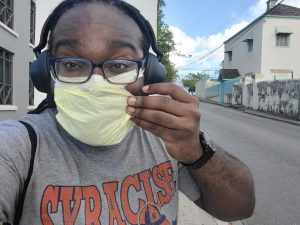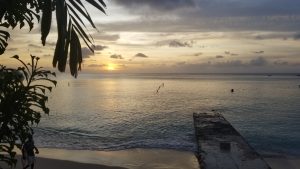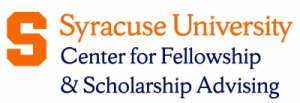Ph.D. Candidate Steven Harris Makes Research Progress and Gains Perspective with Fulbright Grant to Barbados

Steven representing Syracuse while walking in Barbados
Steven Harris, a Ph.D. Candidate in SU's Anthropology Department, was one of four SU students to receive a Fulbright U.S. Student program grant in Spring 2020. Due to pandemic-related delays, Steven finally made it to Barbados in early 2022, where he is now conducting research for his dissertation on metal artefacts found at Trents Plantation in Holetown, Barbados. Steven's research sheds light on the lives of Africans who were brought to Barbados as slaves during the height of the transatlantic slave trade.
CFSA recently asked Steven to reflect on his Fulbright experience thus far. You can read his responses below!
Q: What is one thing that has surprised you about your Fulbright experience?
A: As a black, educated male who has spent much of his life in the U.S., there are still days or moments when I feel like an outsider within my own country. The biggest surprise would have to be how welcoming the Barbados community has been towards me during my stay. In the 6 months I've been in Barbados, I have never felt out of place. While some will make comments about my accent, most are genuinely interested in what has brought me to Barbados, how I got involved in archaeology, and what I hope to learn from my research. For example, upon sharing information about my research with a cab driver, he and I spent the next 40 minutes just talking about the history and politics of the island and how some of the earlier decisions made really shaped how the island was perceived in the 1600s- 1700s. It's nice to see others here with the same passion and interest in Barbados' history because ultimately, that is who my work is for!

A view of the ocean from a beach in Barbados.
Q: Can you describe one or two of your favorite experiences thus far?
A: Easily one of my favorite aspects of being here is exploring the island. The limestone caverns of Harrison Cave; the rugged cliffs of Animal Flower Cave; the glimpse of island history offered by St. Nicholas Abbey and Steam Railway tour and Mt. Gay Rum Tour; the beautiful beaches that stretch the coastline; going to the drive-in theater to watch new releases; and the amazing food one can find at Oistin's Fish Fry every weekend. Barbados really has a lot to offer. Since being here, I had the opportunity to travel around the island with another Fulbright recipient and my partner. It can be a little lonely at times, so being able to share the experience with others has made me appreciate my time here even more.
Q: What are your future plans following the completion of your degree?
A: I love archaeology and the idea of communicating and inspiring the next generations of future archaeologists, so pursuing an academic career where I can teach is one possible route. As an alternative, I would enjoy a role as part of a museum or parks services that would allow me to interact with the community and young adults directly. Regardless of the direction I take, I love traveling and hope to find ways to make it easier for underrepresented young adults to experience other countries aboard, ideally as early as high school. I feel that leaning into the potential discomfort of a new cultural experience allows one to better understand the world around and broaden their horizon of what jobs or careers might be possible. Studying abroad and spending five months in China during my junior year of college changed my entire career trajectory. I feel that if more students had similar opportunities, maybe it would only increase their interest in the world around them.
Q: What would you tell someone who is interested in applying for a Fulbright grant?
A: For those interested, I would highly recommend starting the application process as early as possible. I personally didn’t start the application process until 2 months before it was due, and I would not recommend it. Considering the nature of the grant, you want to be able to take your time and really flesh out your essays, especially for a research grant. Do take advantage of the resources that the Center for Fellowship and Scholarship Advising (CFSA) provides. In my case, Dr. Welshans was a saving grace for me as I was working through my drafts. It also helped that I had a number of close friends reading my drafts and offering feedback. The application process can be stressful, but having others support you along the way really makes a difference! Also note that despite all the research plans you make prior to departing, be prepared to adjust. Some of the plans that I made over a year ago when I initially applied for the Fulbright unfortunately fell through, which resulted in having to readjust how I worked on the community aspect of my research. Circumstances will change and some things will fall through, but being able to be flexible, regardless of the circumstances, will help you achieve your project goals.
Q: Any final reflections on your experience thus far?
A: Fulbright has served as a great means of self-reflection. I think one becomes so accustomed to political and/or social frustrations in the country they are from that they almost accept them as the norm. My time in Barbados has only strengthened my understanding of how some of the norms in the U.S. are not the standard elsewhere. While Fulbright serves as a great way to gain a deeper understanding of your host country, it also helps one better understand and evaluate the country they originated from, for the better.
